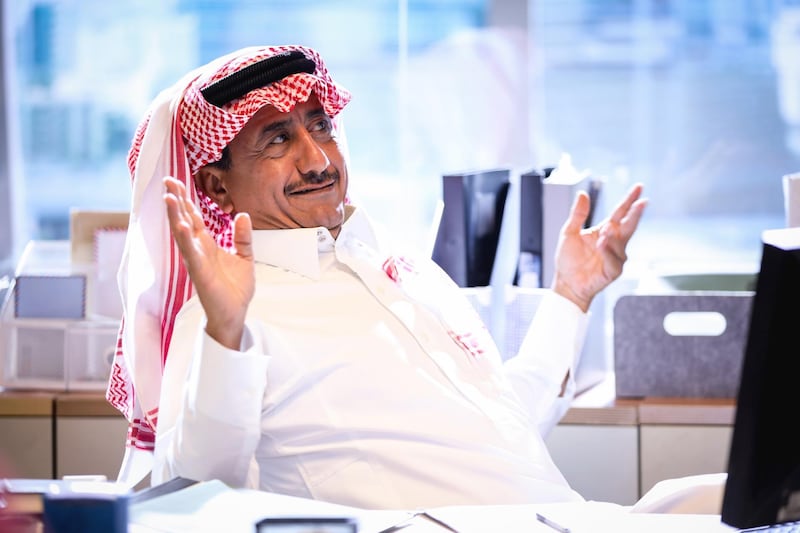When asked whether he wanted to continue making Ramadan comedies, Nasser Al Qasabi’s response was emphatic.
For four decades, the master Saudi satirist entertained and enlightened audiences with a variety of shows, from sitcoms to sketches, taking stock of life in the kingdom.
While the question of whether to star in and produce another series amid the pandemic was never an issue, it was a matter of which story to tell.
“We are living with the coronavirus now and that affected everything in terms of the way we conduct ourselves” he says.
"And considering what all of us have been living through, I just feel that it's a good opportunity, now more than ever, to bring smiles to people's faces."
But it’s never done through cheap laughs.
His latest creation Mamnou' Al Tajawol continues his knack of blending comedy with the timely, therefore making it one of the first Arab comedies dealing exclusively with Covid-19.
Showing nightly throughout Ramadan on MBC1 at 8.25pm UAE time, the series is as an anthology of stand-alone episodes exploring, albeit in absurdist form, how the coronavirus upended many of the social norms of Saudi life.
From the intricacies of holding socially distanced weddings and the rise of Zoom dating, to how Saudi communities handled viruses in the past, each episode features the same cast playing different roles, including Al Qasabi regulars Rashid Al Shamrani and Elham Ali.
With Al Qasabi always keeping his material topical, did he worry, in this case, some of the stories may hit too close to home?
"Certain things need to be in place for these programmes to become successful and accepted," he says, citing how previous works Tash ma Tash, Selfie and Makhraj 7 touch upon upon provocative issues in a nuanced manner.
“In terms of the stories presented each day, each one needs to be almost better than the previous to build that expectation.
“And whenever you are talking about certain issues, it needs to be done in a way where the ultimate goal is touching the heart of the viewers.”
The Al Qasabi apprenticeship
One way this is done is through the use of regular members to build familiarity.
Al Shamrani, who also starred in 2020's Makhraj 7, has been working with Al Qasabi since the fifth series of Tash ma Tash in 1997 in various roles, complimenting his droll screen persona.
Rising Saudi star Elham Ali, who last year appeared in Netflix's first original Saudi production Whispers, is fast establishing herself in the Al Qasabi universe with strong roles in Makhraj 7 and 2019's Al Assouf.
“As an actor you are trying to explore as many different characters as you can in your career, and with this show, I am playing someone different each episode,” she says.
“Without giving too much away, I played roles that include being a wife, daughter, an elderly woman and some of the episodes take place in different times. It’s been rewarding.”
Ali, 31, is the last Saudi talent to benefit from Al Qasabi’s apprenticeship.
Fellow Mamnou' Al Tajawol cast members Abdel Meguid El Rohedy and Heba Al-Hussein also went on to build careers after breakout roles in series helmed by the veteran.
This is a responsibility Al Qasabi takes seriously and frequently comments on across his social media channels.
In January, he posted a Twitter thread predicting within the next 20 to 30 years, Saudi Arabia will lead the Middle East’s film and TV scene, in the way that Egypt, Lebanon and Syria have done over the past century.
٢-
— ناصر القصبي (@algassabinasser) January 25, 2021
وكما سيطرت السينما المصريه طوال القرن الماضي و تألقت الدراما التلفزيونيه اللبنانيه خلال الستينات والسبعينات و أزدهرت الدراما السوريه في التسعينات
أرى الدراما السعوديه ستكون الأكثر بروزاً وسيطره على الشارع العربي في الأربعينات و الخمسينات من هذا القرن
و سيبوني أحلم
The reason for the confidence, he stated, is down to the bold vision laid out by Saudi Arabia's Minister of Culture Prince Badr bin Abdullah bin Farhan for evolving the kingdom's creative industries.
While remaining confident of his hunch, he says all aspects of the industry should mobilise to achieve that goal.
“It’s not just about [financially] supporting projects, it's also about giving Saudi’s opportunities to develop as well,” he says.
“Along with my team, I have been conscious of that and we are working with great Saudi talents, from actors and writers to directors.
“We are not doing this for praise. This is not only our duty to help the next generation, but this is what the Saudi audience expects as well.”
_______________
Read more:
[ 28 of the best Ramadan TV shows to watch in the UAE ]
[ 'Whispers': the first Saudi Arabian Netflix original reflects a more modern kingdom ]
[ Gulf sitcoms ‘Mamnou’ Al Tajawol' and ‘Shaabiat Al Cartoon’ tackle the pandemic with humour ]
_______________






